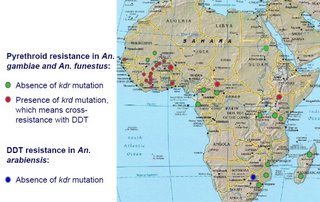|
Tuesday, April 25, 2006
I think I'm probably breaking some rule of blogger etiquitte by performing the dreaded fact-check manoeuver on Colby Cosh just after he linked to my other blog. But it always makes me wince when people I respect stake out strong positions where they're demonstrably wrong on the facts, so I'm afraid I cannot let this pass:
Africans aren't helpless animals--they know what works against malaria. Unfortunately, what works against malaria is DDT. But any country that proposes a program of household DDT application faces starvation at the hands of European bureaucrats and consumers. The nets are an unnecessarily expensive and epidemiologically phony sauve-qui-peut measure, a work-around for what could be described as the greatest ongoing mass murder ever perpetrated. This is one of those strange memes that gets into the air and becomes part of the conventional wisdom, despite the fact that if you dig deep enough the whole thing turns out to be baseless. (Other examples include what Everybody Knows about the industrial revolution or the great depression.) Cosh seems like he usually has pretty good bullshit detectors, and I would have thought that alarm bells would have started ringing when (if?) he noticed that one of the articles he cites was by Dr Rutledge Taylor, the man who directed the film 3 Billion and Counting. Hello there, lying with statistics! The film's site claims that "Africa loses nearly 3000 women and children on a daily basis ... to malaria alone". But let that pass, and let's look at the allegation made against the EU. Let's see what the EU ambassador to the US has to say on the matter (emphasis mine): The European Union has no objection to the safe spraying of houses with DDT for malaria control, but it does have concerns about illegal agricultural uses. The E.U., like the United States and 149 other countries that signed the Stockholm Convention on Persistent Organic Pollutants in 2001, believes that the use of DDT in agriculture should be phased out. The "ban" on DDT is and always has been one on its agricultural use; household use is perfectly allowed. Here (PDF) we find, plain as day on the 4th page, that the "WHO recommends indoor residual spraying of DDT for malaria vector control." And there is a perfectly good reason for this partial ban: basic evolutionary logic suggests that injudicious use of a pesticide like DDT will tend to hasten the adaptation of the pests to the chemical, just as improper use of antibiotics has hastened the evolution of resistance in bacteria. And indeed this is exactly what has happened in some areas (PDF).  Saying that DDT "works" is like saying penicillin or erythromycin "works" -- yeah, for a while. But if you're not careful about it you can end up pushing your enemy to evolve faster. Like Derek Lowe says: "It's life or death for them. Just like it is for us." Addendum: Tim Lambert has been covering this beat for a while, and most of my info on the subject comes by way of him. Anyone curious should read his full archives on the subject here. Edit: I am a blithering idiot and somehow misread that as 300,000. I have no defense other than that this doesn't seem to square with the 3 billion figure that makes the title, but then they don't specifically say that those are deaths. This is an excellent lesson in the perils of firing off posts in a rush. Edit the second: Aha! Now I know where I got that idea in my head. Apparently they did originally say what I thought they said, but then later changed the site after having this, er, discrepancy pointed out. Edit the third: Lambert has more on the effectiveness of nets, which was the subject of Colby's original post. |



